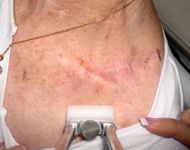- General Dermatology
- Eczema
- Chronic Hand Eczema
- Alopecia
- Aesthetics
- Vitiligo
- COVID-19
- Actinic Keratosis
- Precision Medicine and Biologics
- Rare Disease
- Wound Care
- Rosacea
- Psoriasis
- Psoriatic Arthritis
- Atopic Dermatitis
- Melasma
- NP and PA
- Skin Cancer
- Hidradenitis Suppurativa
- Drug Watch
- Pigmentary Disorders
- Acne
- Pediatric Dermatology
- Practice Management
- Prurigo Nodularis
Article
Innovations in scar prevention, management continue to expand
While scarless surgery remains a dream for dermatologic and cosmetic surgeons, the next best thing - minimal scarring - is becoming more of a reality than ever.

Key Points

Current innovations in scar prevention and management are paving the way toward smoother, less noticeable scars, according to James M. Spencer, M.D., M.S., associate professor of clinical dermatology, Mount Sinai School of Medicine, New York, and a practicing dermatologist in St. Petersburg, Fla.

"For example, the aesthetic outcome is better if you can make the incision in a relaxed skin tension line. A specific example of good surgical technique: Make a bold, clean cut, versus saw-like stabs. End with good woundcare with occlusive dressing."
Topical therapies
Plastic surgeons have long been taught that they should not intervene to improve a scar until at least one year after it has formed. That is because scars improve without any intervention, especially in the first year. However, dermatologists have realized that some procedures for scars, such as dermabrasion, are best performed during the remodeling phase (a month or two after the scar was created), according to Dr. Spencer.
Keeping the body's natural healing ability in mind, dermatologists should know that some scar therapies are a waste of time and money. Breaking vitamin E capsules on scars to minimize their appearance, for example, has shown no benefit in studies and can cause allergic reactions, according to Dr. Spencer (Baumann LS, Spencer JM. Dermatol Surg. 1999;25:827). Topical onion extract therapy (Mederma, Merz Pharmaceuticals) has failed, for the most part, to show benefit in studies as well, he adds.
"Studies show that it does not do anything more than the Vaseline that it is dissolved in," he says (Chung VQ et al. Dermatol Surg. 2006:32:193-198).
Imiquimod
Research on imiquimod's effects on scarring, however, is more of a mixed bag.
In 2005, researchers studied the outcomes of 18 patients, each of whom had two nevi for excision. The patients received topical imiquimod on one excision site and control ointment on the other, nightly for one month. Both patients and investigators rated the imiquimod-treated excision sites worse than the control sites at eight weeks. However, this effect disappeared with time, eventually resulting in no difference between the two sides (Berman B et al. Dermatol Surg. 2005;31:1399-1403).
In the plastic surgery literature, a small study suggests that imiquimod used to treat scarring after breast surgery showed imiquimod-treated breast scars to appear significantly better, although there was initial inflammation (Prado A et al. Plastic Recon Surg. 2005;115(3):966-971).
Other options
Dr. Spencer says he uses silicone gel sheeting to treat hypertrophic scars, because in 10 years of using it, the sheeting has worked to shrink the scars.
Studies also show benefit from using silicone sheeting for preventing and treating hypertrophic scars and keloids, he says (Berman B et al. Dermatol Surg. 2007;33(11):1291-1303). Silicone products for scars are now available as gels, which are easier for patients to use, Dr. Spencer adds.
More invasive options also work. Resurfacing techniques can help to make the healthy skin-scar transition more seamless, according to Dr. Spencer.
"Resurfacing techniques, such as dermabrasion, are particularly effective for contour irregularities. For scars that are indented, for example, you have to sand down the edges to match the valley floor. There are a number of ablative lasers that, of course, can be helpful with that, as well," Dr. Spencer says.
Adding it up
Optimal scar management means putting it all together, according to Dr. Spencer. This includes good surgical technique, good woundcare and therapy, such as the use of silicone gel products.
"There is pretty good evidence that, at very least, these things, collectively, make scars flatter," he says. "But the summation of all this is that you cannot make them go away completely. That is why communication with the patient is so critical, because the truth is that patients want their scars gone, and we can only make them better."
Disclosure: Dr. Spencer is on the advisory board for Graceway Pharmaceuticals and is an investigator for Advanced Bio-Technologies and Suneva Medical.





